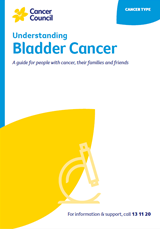MRI scan for bladder cancer
| What is it? | Less commonly, your doctors may recommend an MRI (magnetic resonance imaging) scan to check for bladder cancer. This scan uses a powerful magnet and radio waves to create detailed cross-sectional pictures of organs in your abdomen. |
| What happens before the scan? | Before the scan, let your medical team know if you have a pacemaker or any other metallic object in your body. If you do, you may not be able to have an MRI scan, although some newer devices are safe to go into the scanner. Also ask what the MRI will cost, as Medicare usually does not cover this scan for bladder cancer. Before the MRI, you may be injected with a dye to help make the pictures clearer. You will then lie on an examination table inside a large metal tube that is open at both ends. The person doing the scan (radiographer) will place you in a position that will allow you to stay still and limit movement during the MRI. |
| What happens? | You will hear loud repetitive sounds during the scan. The test is painless, but the noisy, narrow machine makes some people feel anxious or claustrophobic. If you think you could become distressed, mention it beforehand to your medical team. You may be given a mild sedative to help you relax or you might be able to bring someone into the room with you for support. You will usually be offered earplugs, or headphones to listen to music. |
| How long does it take? | The MRI scan takes between 30 and 90 minutes. |
Before having scans, tell the doctor if you have any allergies or have had a reaction to contrast (dye) during previous scans. You should also let them know if you have diabetes or kidney disease or are pregnant or breastfeeding.
→ READ MORE: Further tests for bladder cancer
Podcast: Tests and Cancer
Listen to more of our podcast for people affected by cancer
More resources
Prof Dickon Hayne, Professor of Urology, UWA Medical School, The University of Western Australia, Chair of the Bladder, Urothelial and Penile Cancer Subcommittee, ANZUP Cancer Trials Group, and Head of Urology, South Metropolitan Health Service, WA; A/Prof Tom Shakespeare, Director, Radiation Oncology, Coffs Harbour, Port Macquarie and Lismore Public Hospitals, NSW; Helen Anderson, Genitourinary Cancer Nurse Navigator (CNS), Gold Coast University Hospital, QLD; BEAT Bladder Cancer Australia; Mark Jenkin, Consumer; Dr Ganessan Kichenadasse, Lead, SA Cancer Clinical Network, Commission of Excellence and Innovation in Health, and Medical Oncologist, Flinders Centre for Innovation in Cancer, SA; A/Prof James Lynam, Medical Oncology Staff Specialist, Calvary Mater Newcastle, NSW; Jack McDonald, Consumer; Caitriona Nienaber, 13 11 20 Consultant, Cancer Council WA; Tara Redemski, Senior Physiotherapist – Cancer and Blood Disorders, Gold Coast University Hospital, QLD; Prof Shomik Sengupta, Consultant Urologist, Eastern Health and Professor of Surgery, Eastern Health Clinical School, Monash University, VIC.
View the Cancer Council NSW editorial policy.
View all publications or call 13 11 20 for free printed copies.



